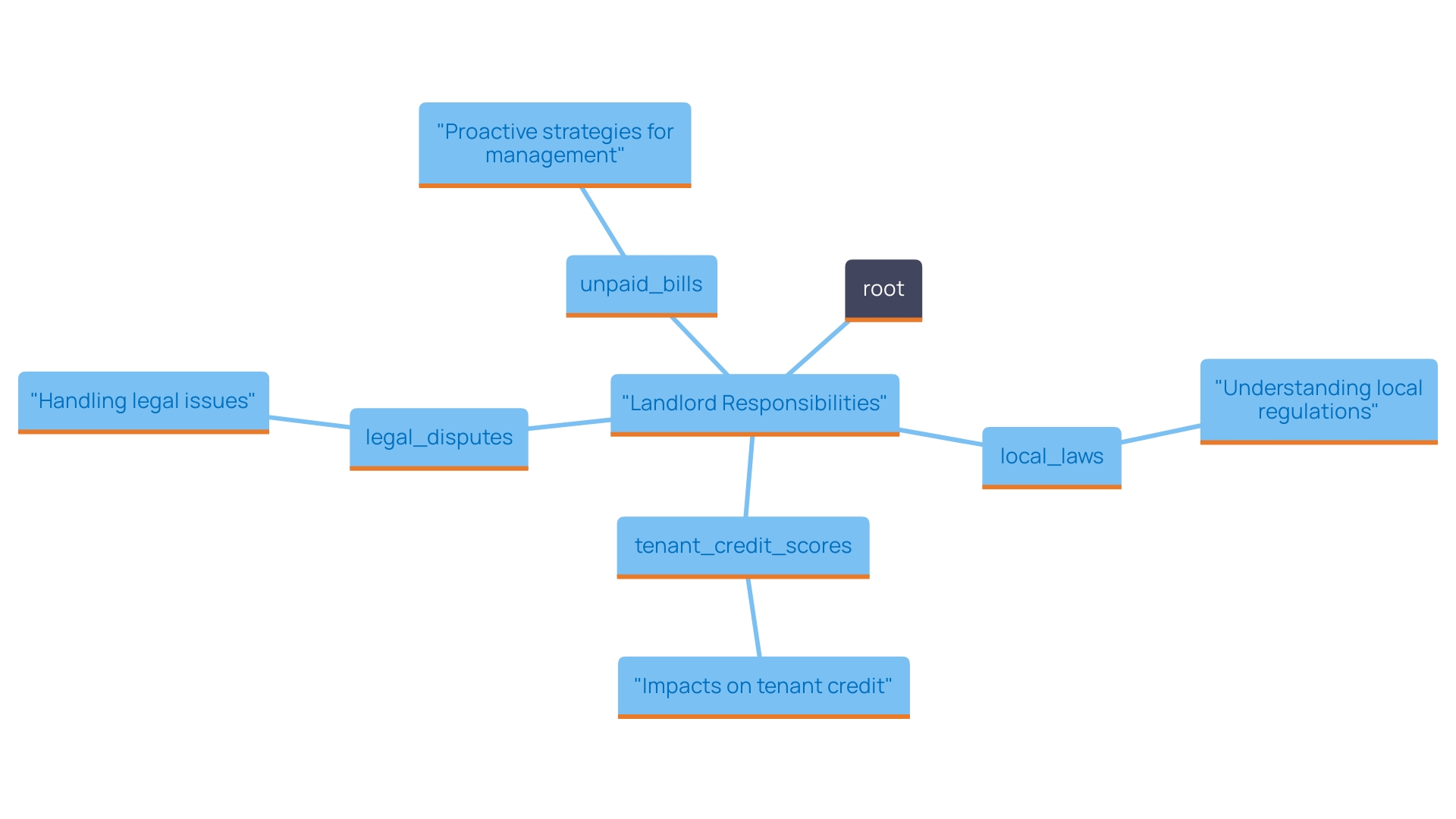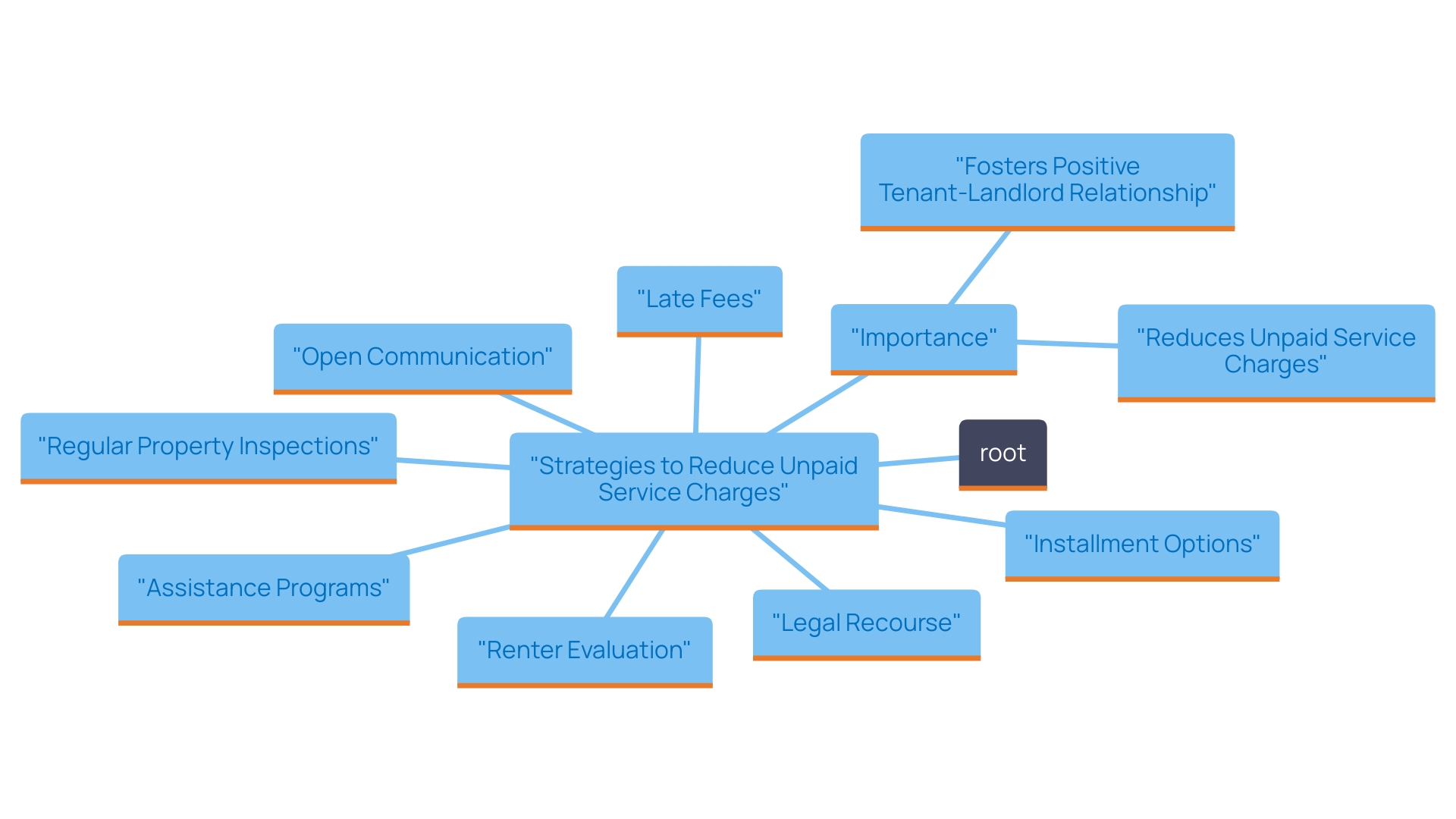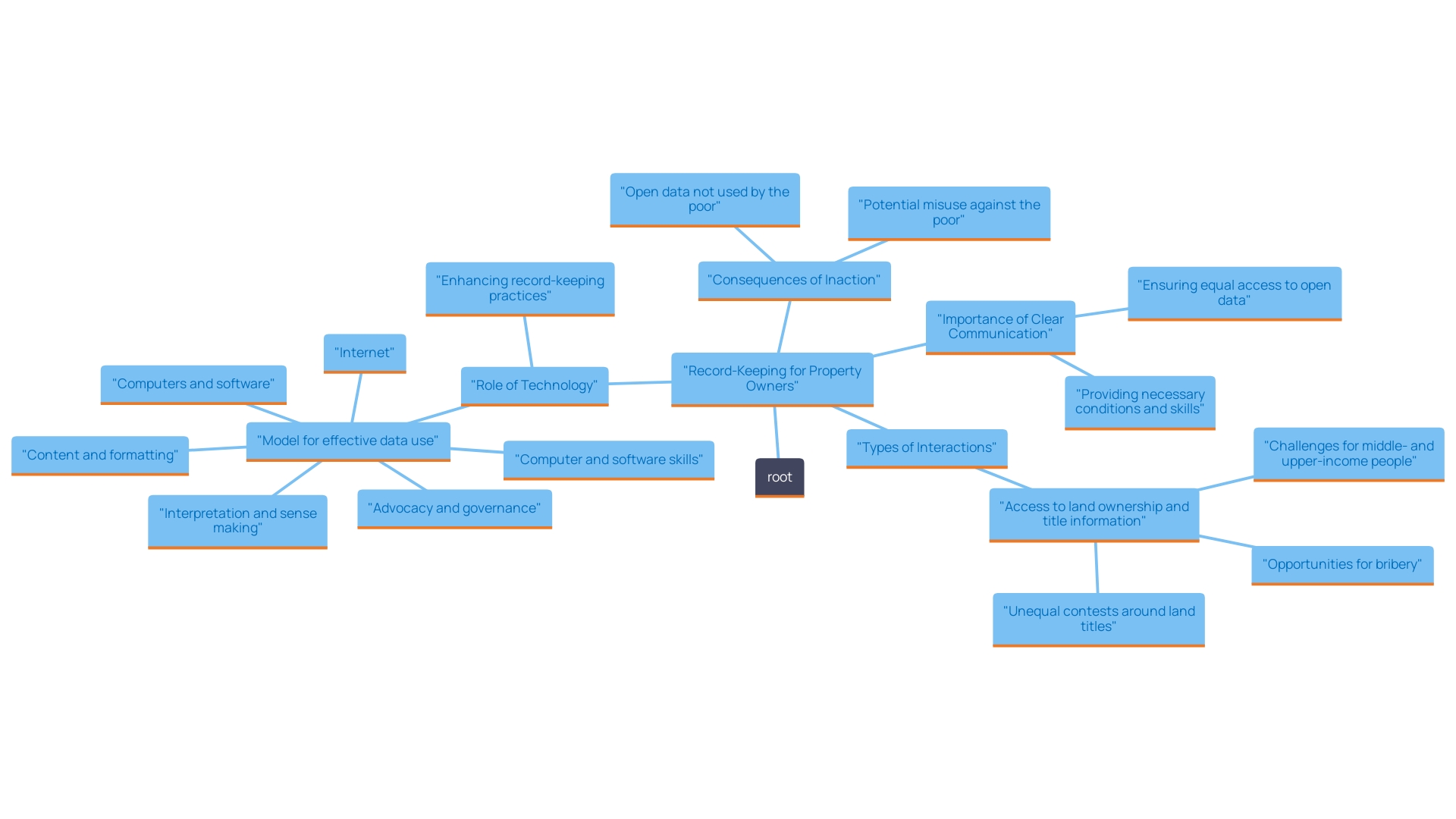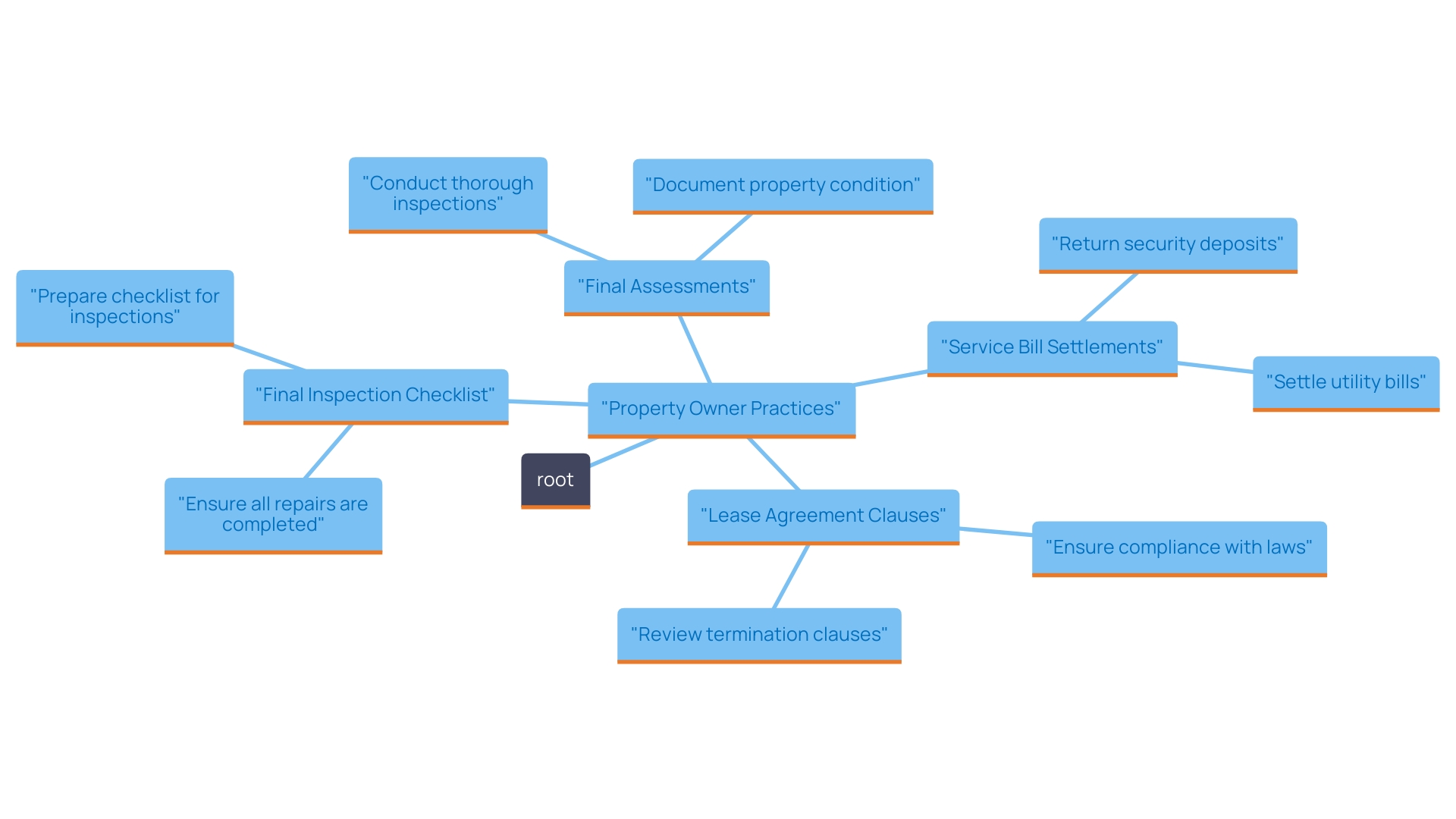Introduction
Navigating the complexities of utility responsibilities is a critical aspect of property management that often goes overlooked. As landlords strive to maintain positive relationships with tenants, understanding their obligations regarding utility bills becomes paramount. This article delves into the essential responsibilities landlords hold in ensuring timely utility payments, the potential repercussions of neglecting these duties, and effective strategies to manage unpaid bills.
From fostering open communication and implementing flexible payment plans to maintaining meticulous documentation and preparing for tenant turnover, a comprehensive approach can significantly mitigate risks and enhance the landlord-tenant relationship. By equipping landlords with the knowledge and tools necessary to manage utility responsibilities, this guide aims to promote a smoother, more efficient rental experience for all parties involved.
Understanding Landlord Responsibilities for Utility Bills
Landlords hold a paramount responsibility for ensuring that linked to their rental properties are settled promptly. In different regions, service providers maintain the power to hold responsible for , even when these services are listed under the renter's name. According to the National Residential Landlords Association (NRLA), a worrying number of tenants are experiencing harmed credit scores due to unpaid rent and related bills in the post-COVID-19 environment. This emphasizes the necessity for property owners to thoroughly understand local laws and regulations governing their responsibilities toward service payments.
Familiarity with these legal frameworks not only protects property owners against potential but also shapes their strategic approaches for managing unpaid bills. For instance, a recent case study illustrates how certain jurisdictions permit service companies to place liens on properties for unpaid bills, further complicating landlords' responsibilities. As stated by Karina Jugo, 'If your , you could be the one in trouble.' This highlights the essential nature of proactive actions, such as creating and performing regular inspections, to reduce the . By taking these steps, landlords can foster a more harmonious landlord-tenant relationship and protect their investments.

Effective Strategies for Managing Unpaid Utility Bills
- Open Communication: Creating clear communication pathways with residents is crucial in handling service charges. Regular discussions about utility usage and bills ensure that occupants are aware of their responsibilities. Such proactive engagement can often prevent unpaid bills from escalating into more significant issues, fostering a cooperative tenant-landlord relationship. As stated by industry specialists, ' is the foundation of a successful rental relationship, leading to prompt transactions and resident satisfaction.'
- Installment Options: Offering tenants can be crucial for those encountering financial difficulties. This method not only eases their immediate financial strain but also guarantees a consistent flow of funds over time. This strategy is particularly relevant in markets like Spain, where the financial capabilities of renters vary significantly, as evidenced by the annual salary analysis conducted in 2020. A recent study indicates that 'Flexible financial options can reduce delinquency rates by up to 30% in struggling communities.'
- Late Fees and Penalties: Implementing a late fee policy for overdue utility charges acts as an effective motivator for prompt settlements. This approach not only encourages adherence to payment schedules but also compensates landlords for any inconveniences arising from delays. Experts suggest that a well-structured late fee policy can enhance compliance without driving residents away.
- Renter Evaluation: Implementing procedures can significantly minimize the risk of unpaid service bills. Evaluating financial stability and the history of service fees during the selection process assists landlords in selecting tenants who are more likely to handle their service obligations efficiently. A comprehensive analysis can reveal that 'Tenants with prior positive financial histories are 50% less likely to default on future bills.'
- Legal Recourse: Familiarizing yourself with legal avenues for collecting unpaid utility bills is crucial. Depending on the amount owed and local regulations, options may include pursuing claims in small claims court or engaging collection agencies. Understanding these processes equips property owners to more effectively. Legal experts emphasize that 'Knowledge of legal options can empower property owners to recover dues without escalating conflicts.'
- Assistance Programs: Knowledge of local assistance programs can be a valuable resource for residents struggling with bills. By offering details about these programs, landlords can assist residents in staying updated on their service fees, promoting goodwill and minimizing possible billing problems. 'Connecting tenants to assistance programs can significantly improve payment compliance,' notes a community service representative.
- Regular Property Inspections: Conducting routine inspections of rental properties is vital for ensuring services are used appropriately. These inspections can assist in recognizing issues early and avert larger problems associated with unpaid service bills, ultimately safeguarding the property owner's investment. Regular evaluations can result in uncovering inefficiencies that, if resolved, could lead to a 15% decrease in expenses for residents.

Documenting Communication and Payment Agreements
Keeping concerning utility invoices and financial agreements is crucial for property owners. This practice involves documenting:
- Conversations with residents about overdue payments
- Any mutually agreed-upon payment plans
- Formal notices regarding unpaid bills
Such serves as a crucial asset during disputes, offering the necessary evidence to substantiate your position, whether during negotiations or legal proceedings.
According to a recent survey by the National Association of Realtors, 70% of conflicts between property owners and renters stem from vague communication about financial responsibilities. To facilitate effective documentation efforts, it is highly advisable to employ digital tools that can streamline this process. Utilizing technology not only ensures that all relevant information is easily accessible but also enhances the security of sensitive data. For instance, American Dream Realty and Management emphasizes the importance of organizing rental documents to prevent future disputes.
Incorporating best practices for documentation not only protects property owners' interests but also promotes . This proactive approach aligns with expert opinions emphasizing the need for clear and in maintaining healthy landlord-tenant relationships. As highlighted in a recent legal case, thorough documentation can greatly impact the outcome in disputes, emphasizing the necessity for property owners to prioritize record-keeping concerning service bills.

Preparing for Tenant Turnover
When a renter chooses to leave a property, property owners must prioritize carrying out a detailed to assess the property's state and ensure that all service bills have been paid. It is crucial to ask that tenants submit evidence of their bill settlements before their departure. This step helps mitigate potential disputes over unpaid bills and ensures that the property owner is not left with unexpected charges. Based on recent case analyses, property owners who confirm payment of services beforehand reported a 30% decrease in conflicts associated with service fees after tenancy.
Moreover, property owners should quickly revise to display the new occupant's details. This proactive measure is crucial for preventing any lapses in service, which can lead to complications for incoming tenants. Including clear clauses in lease agreements that specify responsibilities upon the termination of tenancy can set clear expectations from the outset, minimizing confusion and misunderstandings. For example, property owners who incorporated thorough service terms in their contracts observed a considerable reduction in .
To further streamline the turnover process, landlords may benefit from utilizing a specifically designed for settlement of services. This checklist should encompass all necessary steps, including:
- Verifying that all utility accounts are settled
- Ensuring that any outstanding balances have been cleared
Incorporating insights from real estate professionals can also enhance the turnover process. Alex K., a proactive real estate investor, highlights the significance of preparation when handling rental turnover. He advises, "If you’re self-managing and relatively new to the game, do your homework and have a checklist of how to handle occupancy turnover." This highlights the necessity for thorough planning and communication with contractors to facilitate a seamless transition, ultimately saving time and reducing costs during the turnover process. By adopting these practices, landlords can further safeguard their properties and ensure smoother transitions between occupants.

Educating Tenants on Utility Responsibilities
Landlords play an essential role in ensuring tenants are well-informed about their obligations and the importance of prompt remittances. Starting this education during the lease signing process, enhanced by thorough informational materials like brochures on resource management and access to online resources, establishes a solid basis for accountability. Regular check-ins can further reinforce these lessons, providing an opportunity to address any concerns and prevent potential payment issues from arising.
By providing residents with clear guidelines and resources regarding , landlords empower them to take ownership of their obligations. This proactive strategy not only promotes a culture of but also improves resident satisfaction. As noted by industry leaders,
- 'A culture of can be fostered through effective communication, collaboration, and practical strategies, encouraging for sustained savings and creating energy-efficient communities.'
Additionally, implementing strategies such as periodic reminders, as evidenced in case studies, can significantly enhance resident habits regarding utility usage. Regularly sharing reports on energy consumption encourages tenants to engage actively in conservation efforts, ultimately leading to better payment rates and a more sustainable living environment.
.](https://tely.blob.core.windows.net/telyai/this-mind-map-illustrates-the-key-concepts-related-to-landlord-tenant-communication-and-education-on-utility-management-it-highlights-the-strategies-landlords-can-employ-to-promote-tenant-awareness-and-engagement-in-energy-conservation.jpg)
Conclusion
Landlords must recognize the critical importance of managing utility responsibilities to foster positive relationships with tenants while protecting their investments. Understanding local laws regarding utility payments is essential, as failure to comply can lead to significant financial repercussions and damage to credit scores for both landlords and tenants. By proactively addressing these obligations, landlords can mitigate risks associated with unpaid utility bills, ensuring timely payments and a harmonious rental experience.
Implementing effective strategies such as open communication, flexible payment plans, and thorough tenant screening can significantly enhance the landlord-tenant relationship. Documenting all communications and agreements is vital in resolving disputes and maintaining transparency. Furthermore, preparing for tenant turnover with clear protocols regarding utility responsibilities can prevent misunderstandings and unexpected charges, ultimately safeguarding the landlord's interests.
Educating tenants about their utility responsibilities is equally crucial. By providing resources and maintaining ongoing communication, landlords empower tenants to manage their obligations effectively. This collaborative approach not only promotes timely payments but also fosters a culture of accountability and sustainability within rental properties.
In conclusion, a comprehensive understanding of utility management, coupled with proactive strategies, is essential for landlords aiming to create a positive rental environment and protect their investments.
Frequently Asked Questions
What responsibilities do landlords have regarding service bills for their rental properties?
Landlords are responsible for ensuring that service bills linked to their rental properties are settled promptly. They can be held accountable for unpaid charges, even if the services are under the tenant's name.
How can unpaid service bills affect tenants?
Unpaid rent and related bills can harm tenants' credit scores, which has become a significant issue in the post-COVID-19 environment.
What should landlords do to understand their responsibilities regarding service payments?
Property owners should familiarize themselves with local laws and regulations governing their responsibilities toward service payments to protect against potential legal disputes.
What proactive actions can landlords take to manage unpaid service bills?
Landlords can create clear lease agreements, maintain open communication with tenants, conduct regular property inspections, and implement flexible payment options to reduce the risks associated with unpaid service bills.
How can effective communication help landlords manage service charges?
Open communication with tenants about utility usage and bills can prevent unpaid bills from escalating and foster a cooperative landlord-tenant relationship.
What role do flexible installment options play in managing tenant payments?
Offering flexible installment options can ease tenants' financial strain and ensure a consistent flow of funds, reducing delinquency rates.
Why are late fees and penalties important for landlords?
A late fee policy encourages prompt payment of utility charges and compensates landlords for any inconveniences caused by delays.
How can renter evaluation procedures minimize the risk of unpaid service bills?
Comprehensive renter evaluations help landlords select tenants with a history of managing service obligations efficiently, reducing the likelihood of defaults.
What legal recourse do landlords have for collecting unpaid utility bills?
Landlords can pursue claims in small claims court or engage collection agencies, depending on local regulations and the amount owed.
How can landlords assist tenants struggling with bills?
By providing information about local assistance programs, landlords can help tenants stay updated on their service fees and promote goodwill.
Why are regular property inspections important for landlords?
Routine inspections help identify issues early, ensuring services are used appropriately and protecting the property owner's investment.
What documentation is essential for landlords regarding utility invoices and financial agreements?
Landlords should keep thorough records of conversations about overdue payments, payment plans, and formal notices regarding unpaid bills to support their position in disputes.
What steps should landlords take when a tenant leaves the property?
Landlords should conduct a final assessment of the property, confirm that all service bills have been paid, and revise service accounts to reflect the new occupant's details.
How can education on utility management benefit tenants?
Educating tenants about their obligations and providing resources can empower them to manage their payments effectively, fostering accountability and improving resident satisfaction.
What strategies can landlords use to promote tenant awareness of utility management?
Strategies include providing informational materials during lease signing, conducting regular check-ins, and sharing reports on energy consumption to encourage tenant participation in energy conservation.




